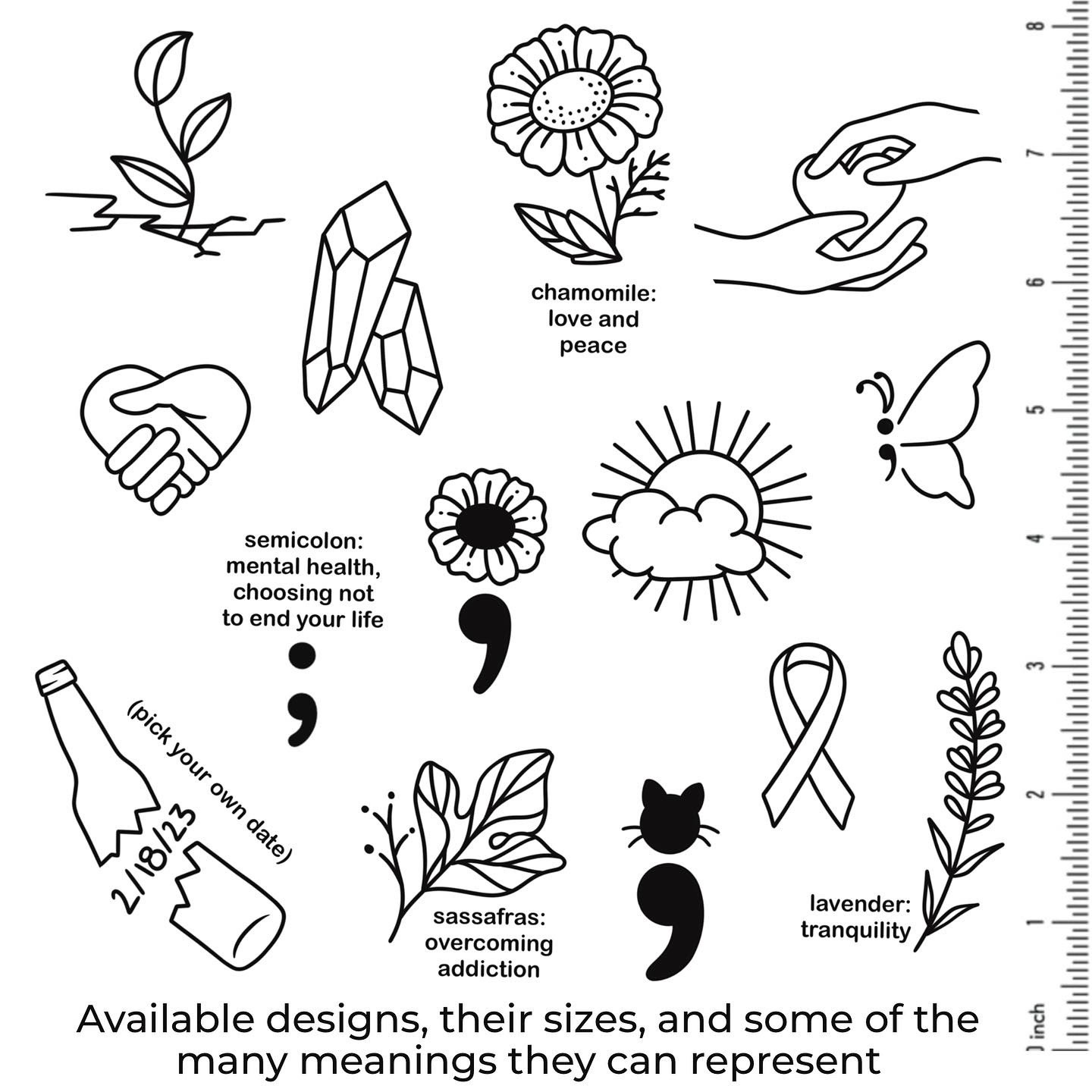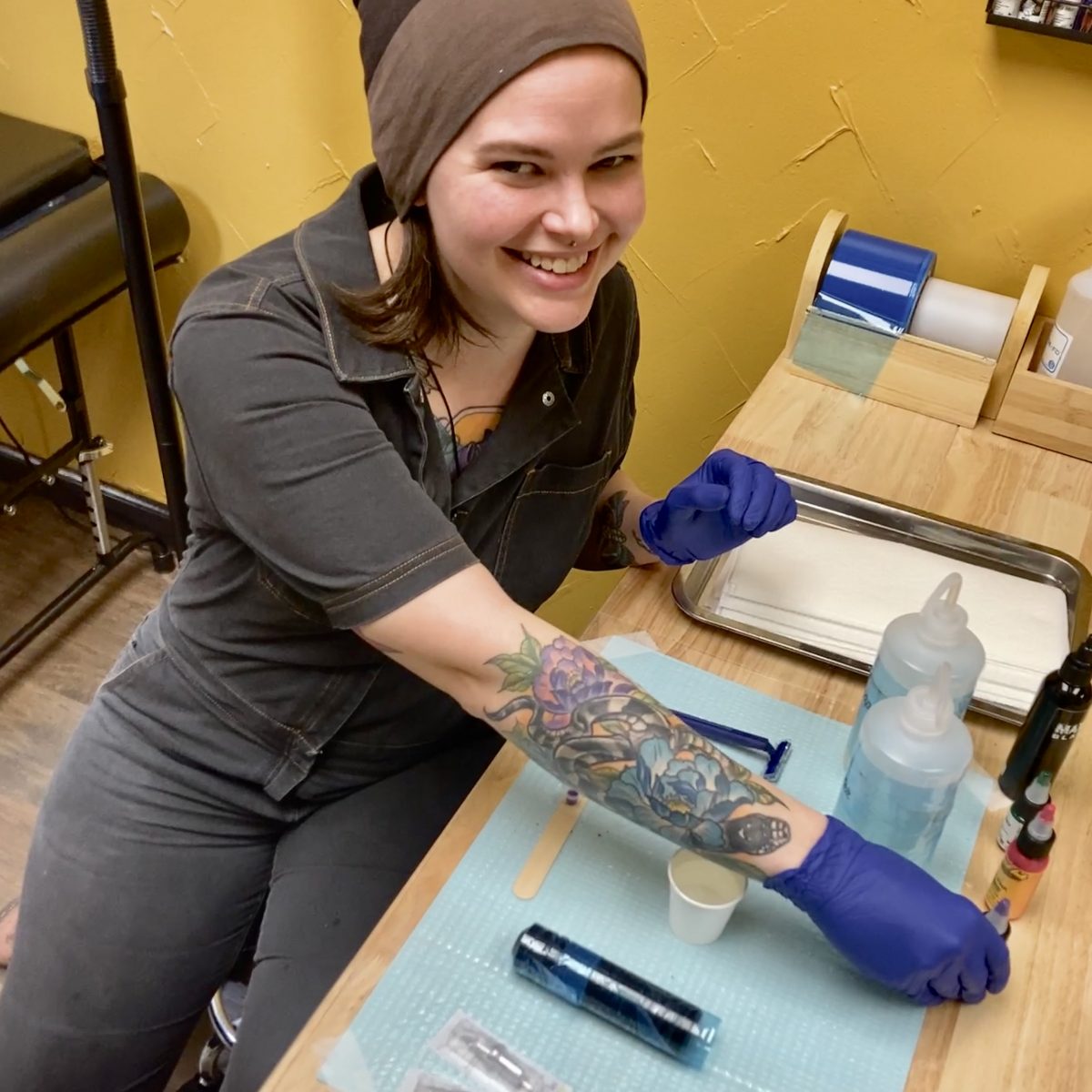Nour Hantouli is a Memphis native who has been involved in activism for almost a decade. In 2014 they began to pursue tattooing, and was eventually able to make it a full-time job. As a result, Hantouli took a step back from organizing work, however they said that community care is “still a cornerstone of my practice.”
Hantouli has more than 10 years of organizing work under their belt. “I got involved in activism when I lived in Middle Tennessee around 2010,” said Hantouli. “The Islamic Center of Murfreesboro was moving to a new location and building a facility to accommodate its members, and there was some really ugly pushback from a small group of ignorant racists. I joined a group that provided support to the Muslim community. They ultimately succeeded in their project and established themselves as a massive source of community care themselves, hosting events that provide things like free meals and domestic violence care kits to anyone who needs help.”
After moving back to Memphis, Hantouli joined the Socialist Party, helped found the Memphis Feminist Collective, participated in the Mariposas Collective, and provided auxiliary support to groups like Mid-South Peace and Justice and Black Lives Matter.
Recently, Hantouli combined their passion for organizing work and tattooing through a mutual aid fundraiser at their shop, Second Skin, at 1296 Peabody Avenue.
According to Hantouli, Aylin Lozano Bravo, a local organizer, activist, and who Hantouli refers to as a “wonderful human,” learned that her father, 45-year-old Lino Lozano “was found beaten and run over by a vehicle.”
To help the family with bills and other needs, Hantouli is offering a set of designs at their shop around the theme of “healing and community care.” The entire amount of each sale will be donated directly to the family.

“We have all struggled at some point in our lives, whether it’s mental health, addiction, abuse, physical illness or injury, or any other catastrophic life event,” said Hantouli. “When we come together to support each other, we can channel that pain into healing. Self-care evolves into community care, and we are stronger together.
The Flyer talked to Hantouli about their inspiration for their designs, why they chose to combine tattooing and organizing work, and more.
Memphis Flyer: How did you get into tattooing?
Hantouli: I was in Chiapas, Mexico, for a language and solidarity program facilitated by a group known as the Zapatistas. While studying there, I got tattooed to commemorate the experience. My Spanish was quite terrible then, and it was a long process in which I had to communicate about the design with the artist via my sketchbook.
When I got back to Memphis, I got offered an apprenticeship if I was willing to return to Mexico. It was about that time I realized my bartending and serving days were reaching their expiration date. I knew it was time to do something else, or, frankly, I didn’t think I was going to make it.
I’d been making art for as long as I can remember, but it was never presented as a smart, or even viable, career path, and working in restaurants drained all the motivation and energy I needed to be an artist. I’d been missing it terribly, and as soon as the idea of learning this craft took hold, I knew it would never leave me alone.
What made you want to open your own shop?
I was in Chiapas, Mexico, for a language and solidarity program facilitated by a group known as the Zapatistas. While studying there, I got tattooed to commemorate the experience. My Spanish was quite terrible then, and it was a long process in which I had to communicate about the design with the artist via my sketchbook.
When I got back to Memphis, I got offered an apprenticeship if I was willing to return to Mexico. It was about that time I realized my bartending and serving days were reaching their expiration date. I knew it was time to do something else, or, frankly, I didn’t think I was going to make it.
I’d been making art for as long as I can remember, but it was never presented as a smart, or even viable, career path, and working in restaurants drained all the motivation and energy I needed to be an artist. I’d been missing it terribly. As soon as the idea of learning this craft took hold, I knew it would never leave me alone.
What made you want to open your own shop
Opening a shop was the furthest thing from my mind, being so fresh in the industry. It’s becoming more common around the country for others in the early years of their career, of course, but it’s just not a thing in Memphis yet. I always knew I wanted to carve out a space that was genuinely safe, accessible, cozy, and a welcoming place for all of our complexity, all our meaningful moments, and all our desire for our stories to be retold through art, the things that make us human.
One of the biggest difficulties for me, personally, in the industry has been the toxic norms around gender, sexuality, and neurodivergence. It’s worth mentioning, even though I do not experience it, that these norms are also massively oppressive in terms of race. It’s a reasonable and normal difficulty to find a shop where you fit in as an artist and as a member of a team. Then you add queerness to the mix, and the window shrinks. Then you add autism to the mix, and it becomes exponentially more difficult to find a place that has the capacity to accept the unconventional ways you need to successfully structure your practice, and trust that you can thrive when you have that acceptance.
Despite this, I planned on speaking with other artists around town. There are several reputable shops where I know people personally who share a lot of my values and do amazing work, but I was also under a lot of pressure, traumatized from past experiences, and just itching to get a machine back in my hand after leaving my last post.
That’s when Jason Morgan from Rose Quartz Body Emporium contacted me on Instagram to see if I was interested in checking out a spot in their building. Rose Quartz is Memphis’s first piercing-only shop. They liked the idea of having a tattooer in the building with them. I thought, “that’s crazy,” but I spoke with their landlord anyway. Next thing you know, I’m signing a lease. Now I am work neighbors with a business that values the full humanity of all their body artists, as well as their clients. The decision to open up a neighboring studio, Second Skin, has been the best crazy decision I ever made in my life.
The dream, however, is not to work alone, but to be a part of a collective with other artists. A collective where both resources and costs are shared fairly, we are motivated by similar values, and we can all learn from each other and share positive, creative energy.
How did you decide on a theme for your designs?
My experience tells me that empathy is a powerful force. Some of the most generous souls I’ve organized with in the past have been the people who have struggled. When we struggle, and we find strength in the compassion from others, it can overwhelm us. When it overwhelms us, it can create an urgency to pass it to others.
My designs centered around the struggles we can overcome with the help of others. Addiction, suicidal ideation, illness, loneliness. That speaks to a lot of people. They are very human things. The feedback was tremendous. Tons of people responded, talking about their own obstacles, and saying things like “I’ve been wanting a tattoo, and I just took this as a sign that the time was right.”
For the past few years, it’s been difficult to retain a faith in humanity, I’ll be honest. It feels like the pandemic, economic crisis, misinformation chaos, and the responses I’ve seen to these things have dragged my soul through broken glass. The privilege of helping facilitate something like this has been healing for me, too.
Why did you feel like this was a good way to raise awareness and money?
In 2021 I did a “Thanksgiving” fundraiser for NTV Rites, a local indigenous organization run by people I used to participate in activism with. I knew I wanted to stay involved in local political movements and community support, but it was hard at the time. Traditional shops can be expensive to run, and often charge artists as much as 50 percent of their earnings to work there, when we are also responsible for purchasing our own equipment and supplies. Now, I work for myself and it affords me the financial stability, time, and energy to use art to do other things I love. I’d been planning on making these solidarity projects a more regular thing.
When I saw my friend Aylin post on Facebook about her father’s horrific attack, my heart hurt for them. Aylin and I were both participants in the Mariposas Collective, which is an organization founded in 2018 to assist families seeking asylum who were recently released from detention centers at the U.S.-Mexico border. She advocates so hard for vulnerable populations, and is always a light and a powerful presence in the movement for justice. And I know her father to be a generous person and a devoted father. I just knew it was the time to do something. This career offers me a kind of visibility that I figured I’d use to reach out – and as I’ve learned from activism, compassionate people abound in Memphis. They came through. All the available appointments have been booked, and currently, we have raised over a thousand dollars in a matter of days.
